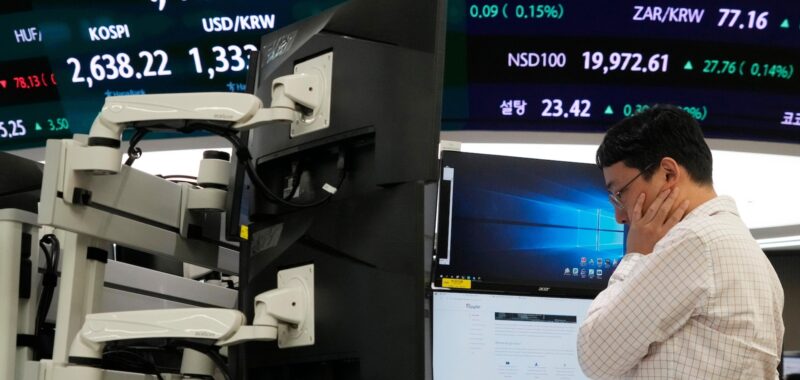Shares rolled higher in Asia on Thursday after U.S. stocks edged back from their records.
Japan’s Nikkei 225 index gained more than 2% and U.S. futures and oil prices also advanced.
The rally in Asia followed an announcement that the Chinese government plans to give cash handouts or discount vouchers to the poor ahead of next week’s National Day holidays. While subsidies to ordinary people are uncommon, the ruling Communist Party sometimes marks special occasions with payments to families in difficulty.
The amount of the payments was not given. But they might help address a weak point for the economy — faltering consumer spending.
A notice on the WeChat social media account of the Ministry of Civil Affairs said authorities would “issue a one-time living allowance to the extremely poor, orphans and other needy people on the occasion of the 75th anniversary of the founding of New China,” which is marked on Oct. 1, next Tuesday.
Hong Kong’s Hang Seng climbed 1.7% to 19,461.25 and the Shanghai Composite index added 0.6% to 2,914.19.
The Nikkei in Tokyo advanced 2.5% to 38,812.94.
South Korea’s Kospi jumped 2.1%, to 2,649.51, after semiconductor maker SK Hynix launched production of a new memory chip for artificial intelligence. SK Hynix shares jumped 8.8%.
In Australia, the S&P/ASX 200 picked up 0.8% to 8,187.60.
On Wednesday, the S&P 500 slipped 0.2% to 5,722.26, a day after setting an all-time high for the 41st time this year.
The Dow Jones Industrial Average dropped 0.7% to 41,914.75 after likewise setting a record the day before. The Nasdaq composite edged up by less than 0.1%, to 18,082.21.
Treasury yields ticked higher in the bond market after sinking the prior day on a surprisingly weak update on confidence among U.S. consumers. The worst drop in three years raised worries about the U.S. economy’s strength, but it also raised expectations for the Federal Reserve to deliver another dose of bigger-than-usual relief through a big cut to interest rates at its next meeting.
On Wall Street, Stitch Fix tumbled 39.5% after the online fashion styling service said its revenue in the current quarter could be 15% to 17% weaker than a year earlier. Its stock has dropped below $3 from $100 early in the pandemic.
KB Home fell 45.4% after reporting profit for the latest quarter that was just shy of analysts’ expectations. The homebuilder, though, said orders picked up in August as mortgage rates came down.
Sales of new homes across the country slowed in August, but not by as much as economists feared, according to a report released Wednesday.
The next date on the calendar circled for a potentially big market move is next week’s monthly update on the U.S. job market.
Investors are concerned over slowing hiring now that inflation has eased significantly from its peak two summers ago. The number of layoffs remains relatively low, but U.S. employers are also more hesitant to hire.
The Fed kept its main interest rate at a two-decade high for more than a year in hopes of slowing the U.S. economy enough to stifle inflation. Last week, it swung toward protecting the job market by cutting the federal funds rate by a larger-than-usual half of a percentage point. Critics say it may be moving too late.
Trump Media & Technology Group jumped 10.5% for its first back-to-back gain in two weeks. The stock had been struggling amid speculation about whether former President Donald Trump would sell some of his shares in the company behind the Truth Social network, now that he is free to do so.
In other dealings early Thursday, benchmark U.S. crude oil picked up 6 cents to $69.75 per barrel in electronic trading on the New York Mercantile Exchange. Brent crude, the international standard, was up 14 cents at $73.04 per barrel.
The U.S. dollar rose to 144.83 Japanese yen from 144.76 yen. The euro was trading at $1.1142, up from $1.1133.
___
AP Business Writer Stan Choe contributed.

